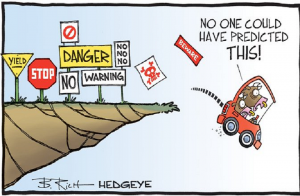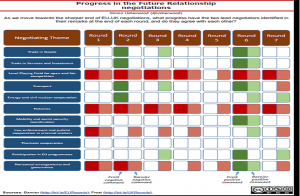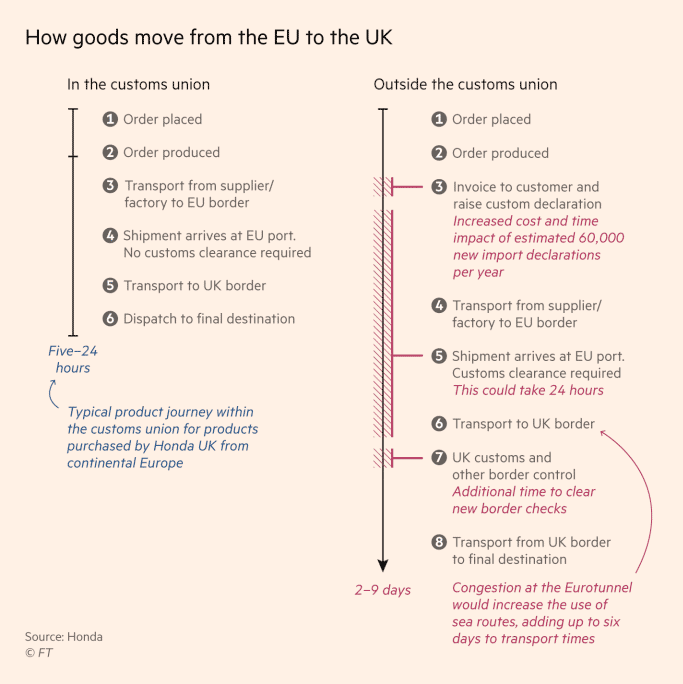Yesterday, we saw the novel sight of a former Conservative premier refusing to support her successor on a critical issue for the government.
100 days to go to the Brexit cliff-edge

Time runs out for an EU-UK trade deal by year-end
The UK has returned to the days of the gentleman amateur in the EU trade negotiations. Neither Cummings or Frost have any experience in trade negotiations, and their tactics are fatally flawed

Only a quarter of UK businesses are ready for Brexit – with just 5 months to go
Only a quarter of UK businesses are ready for Brexit

No Deal risks rise as trade talks develop into standoff
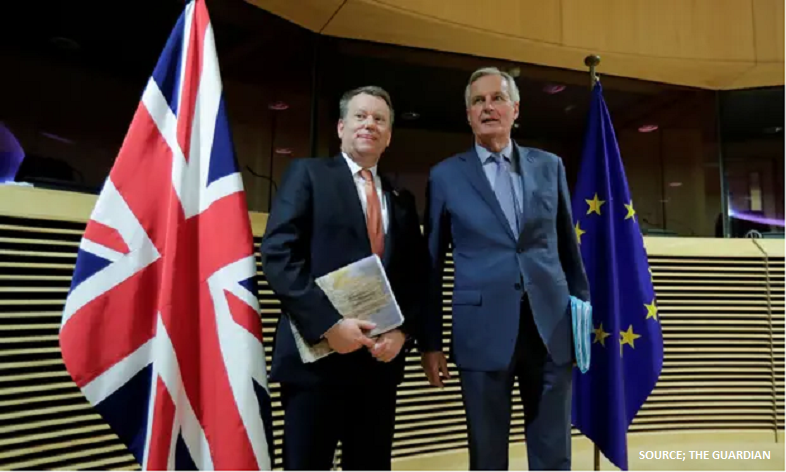
Most companies are rightly focused on the managing the impact of the Covid-19 pandemic. But the risks of a No Deal Brexit at the end of the year are rising. We can only hope next week’s final round of EU27-UK talks produces a sudden breakthrough.
The issue is that the timetable set up under last year’s Withdrawal Agreement allowed for a 2-year transition period after the UK left the EU last January. But it required this to be agreed by the end of June. And as we discussed last month, the UK government seems more inclined to simply leave by the end of the year with No Deal.
The recent ‘mood music’ in the negotiations certainly seems negative, with UK negotiator David Frost writing to his opposite number, Michel Barnier:
“We find it perplexing that the EU, instead of seeking to settle rapidly a high-quality set of agreements with a close economic partner, is instead insisting on additional, unbalanced, and unprecedented provisions in a range of areas, as a precondition for agreement.”
And Barnier’s reply suggests that attitudes are hardening in Brussels:
“The UK cannot expect high-quality access to the EU Single Market if it is not prepared to accept guarantees to ensure that competition remains open and fair. The EU has been clear about this since 2017.”
One key issue is that EU27 are clearly becoming more focused on addressing Covid-19 issues at the expense of Brexit.
This week has seen the launch of a proposed new €750bn (£675bn) EU recovery fund – which will require a lot of negotiation before it is finalised. It also seems possible that the EU27 are no longer so worried about the impact of No Deal on their economies:
- The pandemic has already broken existing supply chains and reduced demand
- If EU companies have to rebuild, then reshoring production from the UK to the EU27 might help to protect jobs and reduce costs
In the meantime, the UK has confirmed our view that there will indeed be a need for border checks on goods crossing the Irish Sea after the Transition period ends. The government is also aiming to recruit 50,000 new Customs staff to handle the extra 400 million Customs Declarations needed each year.
June will be a critical month in the Brexit process. As always, we will be focused on keeping you up-to-date with the key developments.
The Ready for Brexit Directory covers all the key issues for your business

UK plans to press ahead with Brexit at the end of the year
Despite the Covid-19 pandemic, the UK is still aiming to leave the EU at the end of the year.

Your A to Z Guide to the Brexit trade negotiations
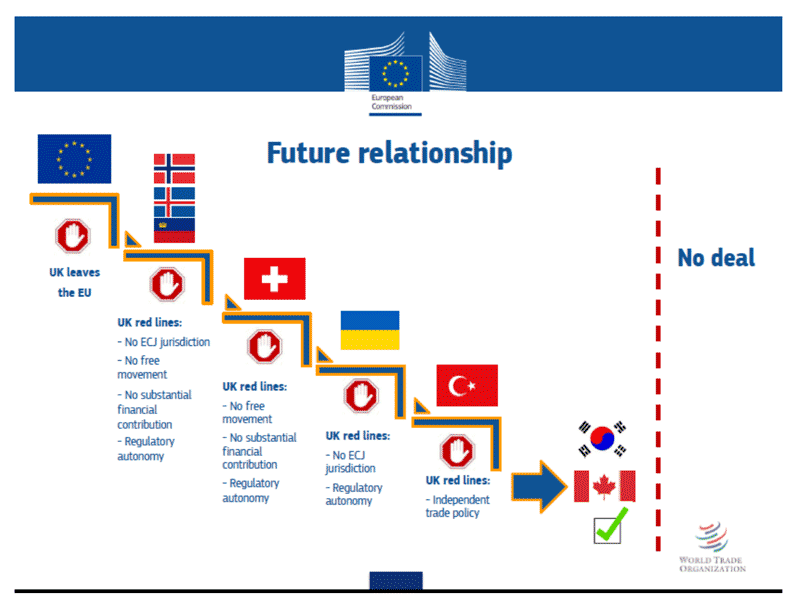
A. Article 50 of the Lisbon Treaty set out the rules for leaving the European Union. As with most negotiations, it assumed the leaving country would present its proposals for the post-withdrawal period – which would then be finalised with the other members. The UK government, however, has still not yet set out its post-Brexit trade objectives, and so the UK will leave the EU tomorrow without anyone knowing what might happen at the end of the year.
B. ‘Brexit means Brexit’, has been the UK’s core statement since Article 50 was tabled. But as we noted back in September 2016, Brexit can actually mean a variety of different outcomes – and they have very different implications as the chart above shows. At one extreme, the ‘Norway model’ is very similar to full EU membership, but with no say on EU decisions. Whereas the ‘Canada model’ is simply a free-trade agreement offering some access to the Single Market for goods, but less access for services (which are 80% of the UK economy). A ‘No Deal Brexit’ means working under WTO rules with arbitrary tariffs and regulations.
C. The European Commission manages the day-to-day business of the European Union on behalf of the European Council, and is effectively its civil service. Its president is Ursula von der Leyen and she re-appointed Michel Barnier to lead the post-Brexit negotiations. As with Brexit itself, the UK’s failure to agree its objectives has allowed Barnier to gain “first mover advantage”, and effectively control the scope of the negotiation, by finalising and publishing the EU’s own negotiating objectives.
D. The Default date for the UK to exit the Transition period is 31 December 2020. It has also been agreed that it can be extended for a further 2 years, if the UK requests this before the end of June – but the UK government has said it will refuse to do this. The UK stance gives the EU a very strong position, as it means they effectively control the timetable as well as the scope of the negotiations.
Barnier has suggested they have “3 goals for 2020: to maintain a capacity to cooperate closely at the global level; to forge a strong security partnership; and to negotiate a new economic agreement (which, most likely, will have to be expanded in the years to come).” Given the EU’s focus on its proposed EU Green Deal, and the need to ensure a positive outcome for the UN Climate Change Conference in Glasgow in November, there may not be much time left for trade talks, given that security is their second priority. This view is reinforced by Barnier’s suggestion that the new economic agreement will have to be expanded after December.
E. The European Union is a treaty-based organisation of 28 countries. As its website notes, it was ‘set up with the aim of ending the frequent and bloody wars between neighbours, which culminated in the Second World War.’ The UK joined the original six members (Belgium, France, Germany, Italy, Luxembourg and the Netherlands) in 1973, along with Ireland and Denmark. Further expansions took place, especially after the end of the Cold War between the West and Russia. At the suggestion of then UK Prime Minister Margaret Thatcher, it was agreed to establish a Single Market and Customs Union in 1993, based on four key freedoms – free movement of goods, services, people and money – and this transformed trading relationships across the continent.
F. The Financial Settlement or ‘divorce bill’ is part of the Withdrawal Agreement and covers the costs of the programmes that the UK agreed to support during the period of its EU membership. Like most organisations, the EU operates on a pay-as-you-go basis and only charges member countries as and when bills actually come due. The UK calculated this to be between £36 billion-£39 billion (€40 billion-€44 billion), depending on the assumptions used.
G. The UK held 2 General Elections whilst finalising the Withdrawal Agreement. The first, in 2017, forced premier Theresa May to rely on the Ulster Unionists in order to gain a working majority in Parliament. The second, in 2019, gave Boris Johnson a comfortable 80 seat majority on the basis that he would “Get Brexit Done”. In reality, however, the only bit of Brexit that has been “done” is the exit from the EU. The process of replacing all the arrangements built up over the past 47 years, since the UK joined the then European Economic Community, has yet to begin.
H. A Hostile No-Deal at the end of December would be the worst of all possible outcomes, as it would mean the UK had to trade on WTO terms. Unfortunately, this is a significant risk, given the range of areas that could cause friction – fisheries policy, financial services, immigration and EU citizen rights etc. The underlying issue is that the UK will become a 3rd country tomorrow night, and lose its veto rights in Brussels as well as the ability to help determine policy. Trade negotiations always cause Winners and Losers to emerge, as they are based on the negotiators conceding something of value to the other side in one area, in order to get back something of value for themselves. And potential Losers generally complain very loudly.
I. Ireland proved to be a key sticking-point in the negotiations, as nobody wanted to disturb the peace created by the Good Friday Agreement in 1998. The Withdrawal Agreement means that Northern Ireland will remain in the UK customs territory and, at the same time, benefit from access to the Single Market without tariffs, quotas, checks or controls. In turn, this means the end of frictionless trade as there will effectively be an EU – Great Britain border running down the Irish Sea, based on the EU’s need for sanitary and phyto-sanitary checks on food products and live animals entering from GB. The EU will also be able to assess risks on any product coming into its market and, if necessary, activate physical controls.
J. June 2016 was the date of the referendum that voted to take the UK out of the EU.
K. Keeping the UK aligned with EU standards is a key concern for many UK businesses. They rely on complex supply chains, and would face major expense if they have to operate to 2 different standards. However, the Chancellor of the exchequer, Sajid Javid, told the Financial Times earlier this month that “There will not be alignment, we will not be a ruletaker, we will not be in the single market and we will not be in the customs union — and we will do this by the end of the year.”
L. Legal issues are, of course, a critical area in the negotiations as the UK currently operates under the jurisdiction of the European Court of Justice (ECJ), and now intends to ‘take back control’ to its own courts. Th ECJ role will continue during the Transition Agreement, but seems unlikely to continue after the transition period ends.
M. Tariffs on Materials and goods will be introduced between the UK and EU27 unless a comprehensive trade deal can be finalised by the end of the year. The EU’s terms for this depend on continued UK alignment with Europe’s societal and regulatory model. If the UK refuses to agree to this, then its trading terms will likely also change with countries outside the EU27. It currently operates under more than 750 free-trade and trade-related agreements negotiated by the EU – and it is unlikely that the UK will continue to benefit from all of them.
N. No Deal means that the UK would have to operate under WTO rules after 31 December 2020. This short Ready for Brexit video explains the complications this would create. The WTO has also warned that the number of Technical Barriers to Trade ‘has grown significantly‘ in recent years, and these can often severely restrict trading opportunities. Plus, EU laws would still have a role under WTO rules for all UK products sold into the EU27 under No Deal. The EU Preparedness Notices also suggest there could be a ban on UK banks providing financial services, as well as a whole host of other restrictions including on travel.
O. The Operation of the Transition Agreement will be in the hands of a new UK-EU Joint Committee. This will replace all the formal and informal interactions that the UK used to have with other member states and EU officials. It may well also become the body though which the UK and EU manage new treaties on global co-operation and security, as well as any future trade agreement.
P. Preparing for Brexit. The Ready for Brexit team has over 250 years’ combined experience of importing and exporting, and we wanted to share this knowledge. Ready for Brexit is a subscription-based ‘one-stop shop.’ It provides a curated Directory to the key areas associated with Brexit – Customs and Tariffs, Finance, Legal, Services and Employment, and Supply Chain. It includes Brexit Checklists; a BrexSure self-audit tool to highlight key risks; a Brexit Negotiation Update section linking to all the key official UK and EU websites; a Brexplainer video on WTO Rules; plus news and interviews with companies about their preparations for Brexit.
R. Regulations can often be a much greater barrier to trade than tariffs, as they set out the rules that apply when products and services are sold in an individual country. The EU never aimed to harmonise regulations across its member countries, as that would be an impossible task. Instead, it has focused on creating a Single Market via mutual recognition of each other’s standards, along with harmonised rules on cross-border areas, such as safety, health, and the environment. Regulations are particularly important in the financial services industry, and many businesses have already relocated relevant parts of their operations into the EU27 so that they can remain authorised to trade.
S. The Single Market seeks to guarantee the free movement of goods, services, people and money across the EU without any internal borders or other regulatory obstacles. It includes a Customs Union, as this short BBC video explains, which seeks to ensure that there are no Customs checks or charges when goods move across individual country borders. With a No-Deal Brexit, however, the UK will become a Third Country and no longer benefit from these arrangements.
T. The Transition Agreement begins after the UK leaves on 31 January 2020. It allows the UK to operate as if it were still in the EU until 31 December 2020 (or possibly December 2022 if the UK government requests an extension by the end of June 2020). The aim is to give negotiators more time to agree how future EU-UK trade in goods and services will operate, and provide guidance for businesses on how the new deal(s) will operate. But trade deals are very hard to do and generally take at least 5-7 years.
U. Unblocked, or frictionless trade, is a key aim of the negotiators. Nobody really wants to go back to the pre-1993 world, before the Single Market arrived, when vast numbers of forms had to be filled in and lorries/ships sometimes stopped for hours for border checks. As Honda explained in June 2018 (see chart) it could easily take between 2-9 days to move goods between the EU27 and UK without a Customs Union, compared to between 5-24 hours today. The cost in terms of time and money would be enormous given that, as Eurotunnel told the Commons Treasury Committee in the month, ‘Over the past 20 years, warehouses have become trucks rolling on the road’.
V. Ursula von der Leyen has taken over from Jean-Claude Juncker as EU Commission President. Her priorities are naturally different from his, with her key focus being to deliver the EU Green Deal. On Brexit, she noted earlier this month in London that “The truth is that our partnership cannot and will not be the same as before. And it cannot and will not be as close as before – because with every choice comes a consequence. With every decision comes a trade-off. Without the free movement of people, you cannot have the free movement of capital, goods and services. Without a level playing field on environment, labour, taxation and state aid, you cannot have the highest quality access to the world’s largest single market. The more divergence there is, the more distant the partnership has to be.“
W. WTO Terms are not actually “terms of trade” at all, but simply a reference to the basic rules set out by the World Trade Organisation. As our Brexplainer video explains, they mean that a tax, called “Tariffs”, would be reintroduced for trade in goods between the UK and the EU27. Services, including financial services, could also be impacted by restrictions on market access. Border controls and customs checks could add time to shipments and impact supply chains. This could be particularly important for highly regulated sectors such as chemicals. Documentation and paperwork will increase, as businesses will need to be able to prove the nature and origin of their goods, especially if they use parts or components from several different countries. As a result, no country currently trades on WTO terms, as this briefing from the independent academic group, The UK in a Changing Europe, explains.
Z. Zig-zag perhaps best describes the process that has led us to this point. It began long ago when Margaret Thatcher resigned in 1990, as the catalyst was partly her hostility to European Monetary Union. Fast forward through many zigs and zags by both main political parties, and we finally reached June 2016 and the Brexit referendum – and then, in turn, tomorrow’s UK’s exit from the EU.

The general election result and Brexit: What next?
The general election result has provided a landslide victory for the Conservative party. Boris Johnson will now be putting everything into ‘getting Brexit’ done. But, what does that mean for your business?

Don’t be beaten by Brexit fatigue
The outcome of next week’s general election is difficult to call. One thing that is certain is that the uncertainty surrounding Brexit won’t immediately lift.

Why the election result will not likely clean up the Brexit mess
If Boris Johnson wins the election, the UK will officially leave the EU by the end of January.
Yet leaving the EU will simply be “the end of the beginning,” in Churchill’s famous phrase. The really hard part of Brexit will be about to begin. And there will be just eleven months left before the end of the Transition Agreement on 31 December 2020.


